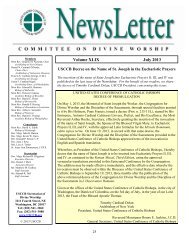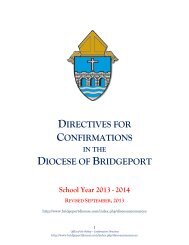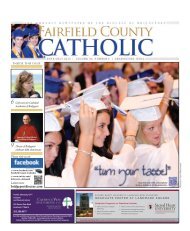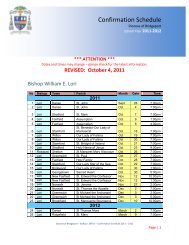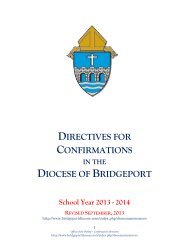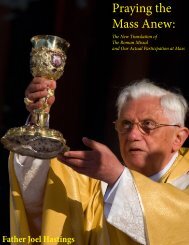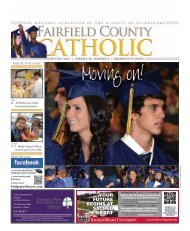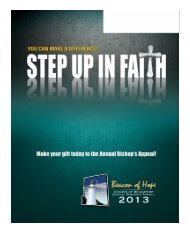June 2011 - Diocese of Bridgeport
June 2011 - Diocese of Bridgeport
June 2011 - Diocese of Bridgeport
You also want an ePaper? Increase the reach of your titles
YUMPU automatically turns print PDFs into web optimized ePapers that Google loves.
2<strong>June</strong> <strong>2011</strong>Soundings“The Liturgy <strong>of</strong> the Word”As we look ahead to the implementation <strong>of</strong> the newly translated Roman Missal,we are taking a tour <strong>of</strong> the Mass – looking at the Church’s fundamentalteachings concerning the liturgy and sacraments and studying the individualparts <strong>of</strong> the liturgy. In this installment, we take an initial look at the Liturgy <strong>of</strong> the Word.This part <strong>of</strong> the liturgy includes the readings from Sacred Scripture together with theresponsorial psalm and the Gospel acclamation, as well as the homily, the Creed,and the Prayer <strong>of</strong> the Faithful.We first turn our attention to the place <strong>of</strong> Scripture inthe liturgy. As I have mentioned in previous columns,Scripture is not “confined” to the Liturgy <strong>of</strong> the Word.The entire liturgy is preeminently Scriptural. The composition<strong>of</strong> the prayers; the mysteries <strong>of</strong> the Lord whichare re-presented in the liturgical year, especially Hisdeath and resurrection; the words and gestures <strong>of</strong> boththe priest and the congregation – all these are thoroughlyScriptural in their origin and content (see Vatican II,Constitution on the Liturgy, no. 24). Yet it is in the Liturgy<strong>of</strong> the Word where we hear and respond to the proclamation<strong>of</strong> Scripture itself. On a typical Sunday, the Liturgy<strong>of</strong> the Word consists <strong>of</strong> an Old Testament reading, theResponsorial Psalm, a New Testament reading, theGospel Acclamation and the Gospel reading, followedby the homily. Before looking at how these readings arerelated to one another and to us, however, let us pause toreflect on the presence <strong>of</strong> Christ in the Word proclaimed.We should not underestimate its importance or lullourselves into thinking that it isn’t necessary to arriveat Sunday Mass in time to hear the Scripture readings.Echoing the Church’s long tradition, the Churchteaches us that when Scripture is proclaimed, it is Christhimself who speaks to us (see, for example, Constitutionon the Liturgy, no. 7). Indeed, the Church “venerate[s]the Scriptures as she venerates the Lord’s Body. Shenever ceases to present to the faithful the Bread <strong>of</strong> Life,taken from the one table <strong>of</strong> Christ’s Word and Christ’sBody” (Catechism <strong>of</strong> the Catholic Church, no. 103; DogmaticConstitution on Divine Revelation, no. 21). Referring toJesus as “the Word made flesh,” Pope John Paul IIspoke about “the sacramentality <strong>of</strong> revelation” – theEternal Word <strong>of</strong> God is perceived in and through the“sign” <strong>of</strong> Christ’s humanity, including his words anddeeds. And, just as we approach the altar to receiveChrist’s Body and Blood, so, too, by way <strong>of</strong> analogy, dowe acknowledge the presence <strong>of</strong> Christ in the Word proclaimed(see, Pope Benedict XVI, The Word <strong>of</strong> the Lord,no. 56). Whether or not we always admit it, our heartsare hungry and our souls are thirsting for God’s Wordand nowhere is the Word <strong>of</strong> God set forth so richly andso effectively as in the liturgy.In his exhortation entitled The Word <strong>of</strong> the Lord, PopeBenedict refers to the liturgy as “the home <strong>of</strong> the Word.”He goes on to say that “…the liturgy is the privilegedsetting in which God speaks to us in the midst <strong>of</strong> ourlives; he speaks today to his people who hear his voiceand respond.” This takes place through the action <strong>of</strong>the Holy Spirit. Scripture itself is the inspired Word <strong>of</strong>God because <strong>of</strong> the Holy Spirit, and for this reason noother writings can be substituted for Scripture duringthe Liturgy <strong>of</strong> the Word. And it is the Holy Spirit whoopens our hearts so that we can absorb the Word andlet it become truly a part <strong>of</strong> us and our daily lives, as acommunity <strong>of</strong> faith and as individuals (The Word <strong>of</strong> theLord, no. 52).Indeed, Scripture itself cannot be properly understoodapart from the liturgy where the Word <strong>of</strong> God isproclaimed and explained, even as the liturgy cannotbe fathomed without Scripture. In the Church’s liturgywe come to see Christ, most especially in his death andresurrection, as the center <strong>of</strong> Scripture. And the Churchhelps us to grasp the meaning <strong>of</strong> Scripture by presentingit in an orderly way throughout the liturgical yearin which the mysteries <strong>of</strong> Christ – his Incarnation andBirth, his Preaching and Miracles, his Suffering, Death,Resurrection, and Exaltation – are unfolded for us yearafter year. Through the liturgy we “touch” the wordsand deeds <strong>of</strong> Jesus which are made present to us in andthrough the liturgy. By participating in the liturgy, wehave living contact with all that Christ said and did tosave us, so much does He love us. And just as there isseparation between what God says and what he does,so, too, the Word <strong>of</strong> God is intrinsically linked to thesacramental signs <strong>of</strong> the liturgy which actualize what theWord proclaims. The Word has become flesh and in theEucharist Christ’s flesh is given us as “the bread <strong>of</strong> life.”And the Word proclaimed has as its one purpose to leadus to “the sacrifice <strong>of</strong> the new covenant and the banquet<strong>of</strong> grace, that is the Eucharist” (The Word <strong>of</strong> the Lord,quoting Ordo Lectionum Missae, no. 10).We now turn to how the Scripture readings arearranged in the Liturgy. We will take as our “prototype”the Sunday Eucharist. Except for the Easter Season, thefirst reading is taken from the Old Testament and most<strong>of</strong>ten is intimately related to the Gospel reading. Sundayafter Sunday, God’s eternal plan <strong>of</strong> salvation is presentedto us, stretching back to creation, moving through thesaving history <strong>of</strong> the Chosen People, culminating inChrist, and extending to these “last days” in which welive. By being attentive to interplay between the OldTestament and the New Testament, we discover Christ asthe center <strong>of</strong> both Scripture and the saving plan <strong>of</strong> God.At first glance, however, the second reading, <strong>of</strong>tenfrom one <strong>of</strong> St. Paul’s epistles, sometimes does not seemto be “in sync” with the Old Testament reading and theGospel. In preparing homilies, it can be a challenge tosee how all three readings are related. The temptationis simply to put the second reading “in brackets”or preach on the second reading while remaining largelysilent about the Old Testament reading and the Gospel.However, the “connectedness” <strong>of</strong> all three readings(together with responsorial psalm”) becomes moreevident when we reflect on “the inherent unity <strong>of</strong> the➤ continued on page 11ON THE COVERTrinity Catholic High School ValedictorianShilpa Reddy Kolli exults in the day during commencementexercises in Stamford. She was one <strong>of</strong> almost 600young women and men who graduated from Catholichigh schools this month. The graduations were a celebration<strong>of</strong> academic achievement and growth in faith.Above the mast: A youngster in the Vietnamese community<strong>of</strong> St. Augustine Cathedral Parish reflects prideand happiness at the ordination <strong>of</strong> Augustine TanMinh Nguyen as a transitional deacon, the last stepbefore priesthood. (Photos by Amy Mortensen)5 PARISH FINANCEMeet Richard Oparowski11 SUMMER VOCATIONImportant decisions16 INVENTION CONVENTIONSt. Ann School22 ST. JOSEPH HIGHPitching Ace| CONTENTS28 SCIENCE OLYMPICSStudents compete33 SECOND FOUNDERFr. Greg Markeyon St. Bonaventure34 CALENDAROF EVENTSSummer activites



